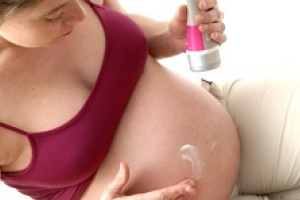Pregnancy gingivitis, freebie appointments and whether you can whiten: here’s the lowdown on oral health when you’re expecting.
You’ll have seen a whole lot of physical changes during pregnancy and your mouth is no exception. Oral problems are pretty common in pregnancy, with about 40% of pregnant women getting some kind of gum disease (ACOG, 2013).
Why are issues with teeth more common during pregnancy?
"You’re more likely to get the gum infection that gum disease can start as – gingivitis – when you’re pregnant."
(American College of Nurse-Midwives, 2014)
Gingivitis can cause gum swelling and tenderness and, if not treated, it can affect the tissues that hold your teeth in place (ADA, 2011). You’re also more likely to get benign gum lesions, wobbly teeth, tooth erosion, tooth decay and gum disease (ACOG, 2013).
Why does it matter?
Some research suggests a link between gum disease and an increased risk of adverse pregnancy outcomes, e.g. preterm birth, low-birth weight or pre-eclampsia (Xiong et al, 2006; Canadian Family Physician, 2009). Yet other research has shown no association between gum disease and adverse pregnancy outcomes or any reduction in those risks by treating it (Srinivas et al, 2009; Uppal et al, 2010).
In any case, both the American Dental Association and the American College of Nurse-Midwives say untreated tooth or gum infections might be harmful for you and your baby (ADA, 2011). And what’s more, neither the interventions that prevent and treat periodontitis nor the use local anesthetics during pregnancy have been associated with increased risk to the baby (Canadian Family Physician, 2009). So that combined with the increased risk to your teeth in pregnancy and it really is worth looking after your teeth when you’re pregnant. Here’s how...
1. Keep your teeth healthy
As pregnancy can be hard going on your oral health, it’s crucial to look after your teeth and gums at home too. Try to:
- Brush your teeth twice a day using a soft-bristled toothbrush. Brushing twice a day helps prevent plaque build-up, gum disease and tooth decay. Using a soft bristled toothbrush is important as your gums are more likely to bleed in pregnancy.
- Use toothpaste that contains fluoride as it helps remove plaque and strengthen enamel.
- Chew sugarless or gum containing xylitol, two to three times a day as chewing gum helps to decrease the amount of plaque on your teeth.
- Limit the amount of sugar you consume as sugar changes to acid and plaque on teeth. This can cause periodontal disease and tooth decay.
- Eat more nutritious snacks, such as raw fruits, vegetables, yogurt or cheese as these contains less sugar.
- Drink water or low-fat milk as these contains little or no sugar.
- Avoid fizzy or carbonated drinks as these contain lot of sugar. Also try to avoid drinks like soda or even juice.
- Floss daily.
- Avoid smoking in pregnancy, as periodontal disease is most prevalent in women who smoke in pregnancy.
(American College of Nurse-Midwives, 2014)
2. Claim free dental care
Hoorah – a pregnancy perk. Yep, dental care is free during pregnancy and for a year after your due date. So there’s no excuse not to book your appointment. Just apply for a Mat B1 and ask your doctor, nurse or midwife for the form (Gov.UK, 2012). You need to complete some of the form then a medical professional signs it.
3. Tell your dentist that you’re pregnant
As soon as you make your appointment – and when you sit in the chair – it’s crucial that you tell them that you’re pregnant. That way, if you need any medications for your teeth, your dentist will prescribe only the ones that are safe for you and your baby (WebMD, 2005; American College of Nurse-Midwives, 2014).
It’s also important to tell your dentist about any medications you are currently taking. Make sure you also tell them about any changes you’ve noticed in your teeth too since you became pregnant (American College of Nurse-Midwives, 2014).
It’s best to avoid routine X-rays in pregnancy but they can be done if it’s necessary or in an emergency by shielding your abdomen and thyroid. While you can have dental treatment at any point in pregnancy, it is best to delay the treatments and procedures until after the first trimester (WebMD, 2005; American College of Nurse-Midwives, 2014).
4. Stop morning sickness affecting your teeth
If you’re getting morning sickness and vomit, here’s a handy hint: rinse your mouth with a teaspoon of baking soda mixed in a cup of water. Rinsing with baking soda neutralises the stomach acids in your mouth so they don’t harm your teeth.
Also try to wait one hour after vomiting before you brush your teeth. This is because brushing right after vomiting might wear away the protective lining of your teeth (American College of Nurse-Midwives, 2014).
5. It’s not safe to whiten your teeth when pregnant
There’s not a whole lot of research on teeth whitening during pregnancy. But as there’s no guarantee it’s safe, the advice is not to do it at all when you’re pregnant or breastfeeding. Teeth whitening involves loads of chemicals, the safety of which is not known (WSJ.com, 2004).
This page was last reviewed in July 2018.
Further information
Our support line offers practical and emotional support with feeding your baby and general enquiries for parents, members and volunteers: 0300 330 0700.
We also offer antenatal courses which are a great way to find out more about birth, labour and life with a new baby.
Make friends with other parents-to-be and new parents in your local area for support and friendship by seeing what NCT activities are happening nearby.
ADA. (2011) Oral health during pregnancy. JADA. 142(5):574. Available from: https://jada.ada.org/article/S0002-8177(14)62017-1/fulltext (Accessed 1st July 2018).
American College of Nurse-Midwives. (2014) Dental care in pregnancy. Available from: https://www.midwife.org/acnm/files/ccLibraryFiles/.../Dental_Care_Pregnancy.pdf (Accessed 1st July 2018).
Canadian Family Physician. (2009) Dental care during pregnancy. Available from: http://www.cfp.ca/content/55/6/598.full (Accessed 1st July 2018).
Gov.UK (2012) Maternity Certificate. MatB1. Available from: https://www.gov.uk/government/publications/maternity-certificate-mat-b1-guidance-for-health-professionals (Accessed 1st July 2018).
Srinivas SK, Sammel MD, Stamilio DM, Clothier B, Jeffcoat MK, Parry S, Macones GA, Elovitz MA, Metlay J. (2009) Priodontal disease and adverse pregnancy outcomes: is there an association? American Journal of Obstetrician and Gynecologist. 200 (5):497. Available from: https://www.ncbi.nlm.nih.gov/pubmed/19375568 (Accessed 1st July 2018).
The American College of Obstetricians and Gynecologists. (2013) Oral health care during pregnancy and through the lifespan. Number 569. Available from: https://www.acog.org/Clinical-Guidance-and-Publications/Committee-Opini… (Accessed 1st July 2018).
The Wall Street Journal. (2004) Pregnant? Skip teeth whitener. Available at: http://online.wsj.com/ad/article/cigna/SB109691321837335486.html (Accessed 1st July 2018).
Uppal A, Uppal S, Pinto A, Dutta M, Shrivatsa S, Dandolu V, Mupparapu M. (2010) The effectiveness of periodontal disease treatment during pregnancy in reducing the risk of experiencing preterm birth and low birth weight: a meta-analysis. Journal of American Dental Association. 14(12):1423-1434. Available from: https://www.ncbi.nlm.nih.gov/pubmed/21119126 (Accessed 1st July 2018).
WebMD. (2005) Dental care and pregnancy. Available at: https://www.webmd.com/oral-health/dental-care-pregnancy#1 (Accessed 1st July 2018).
Xiong X, Buekens P, Fraser WD, Beck J, Offenbacher S. (2006) Periodontal disease and adverse pregnancy outcomes: a systematic review. BJOG. 113(2):135-143. Available from: https://obgyn.onlinelibrary.wiley.com/doi/full/10.1111/j.1471-0528.2005.00827.x (Accessed 1st July 2018).







